Sociology: Career Paths, Opportunities, and Future Prospects
VerifiedAdded on 2020/03/28
|5
|985
|52
Essay
AI Summary
This essay delves into the multifaceted field of sociology, examining its scope, relevance, and impact on understanding society, communal revolutions, and social behavior. It highlights how sociology graduates can analyze community structures, social orders, and individual interactions within these contexts. The essay explores diverse career paths for sociology graduates, including public administration, group employment, criminal justice, business, education, and healthcare. The conclusion emphasizes the promising future of sociology, driven by the increasing need to address social issues and the growing demand for professionals in policy research, clinical practice, and academia. The essay references various scholarly works, including those by Abbott, Coser, and Helmes-Hayes, to support its arguments and provide a comprehensive overview of the subject matter.
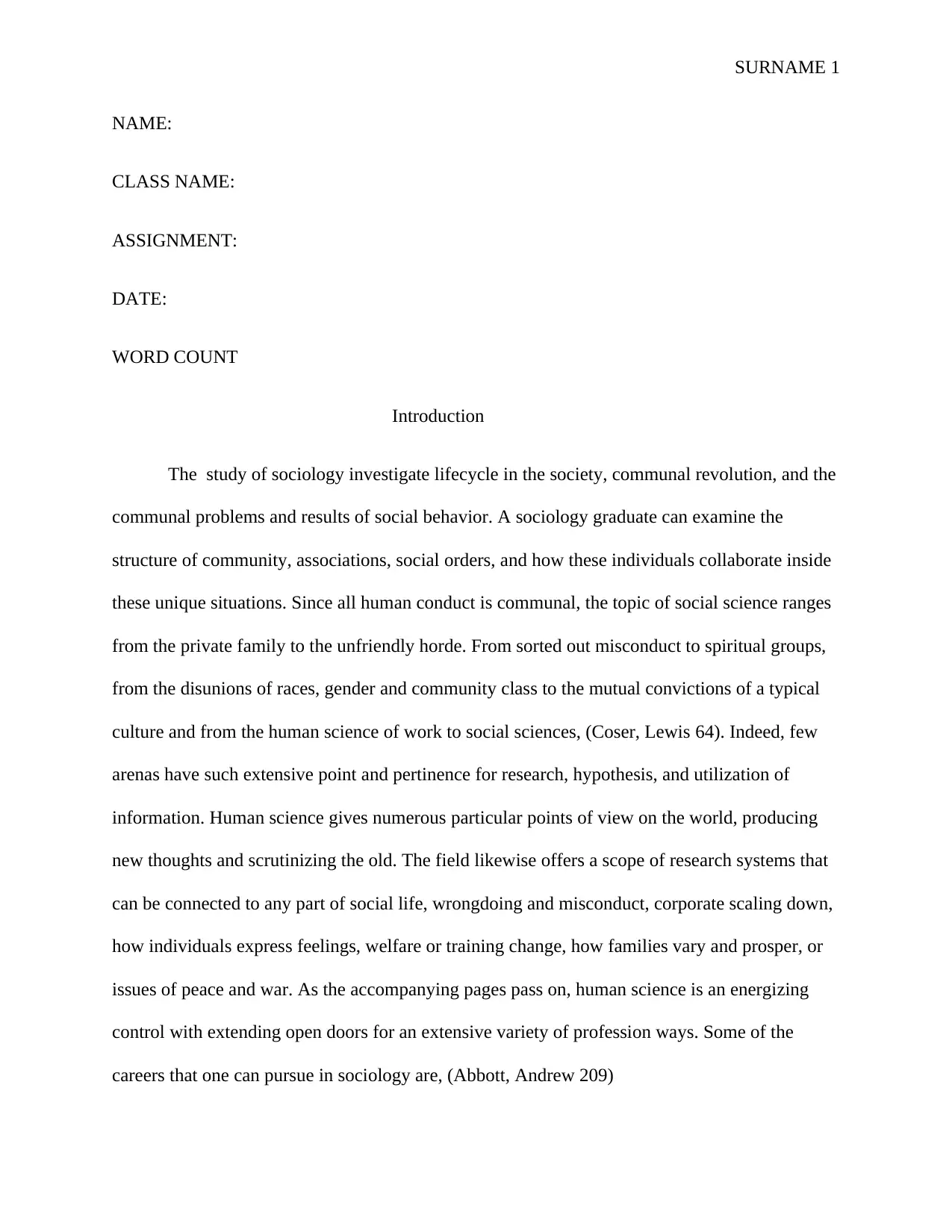
SURNAME 1
NAME:
CLASS NAME:
ASSIGNMENT:
DATE:
WORD COUNT
Introduction
The study of sociology investigate lifecycle in the society, communal revolution, and the
communal problems and results of social behavior. A sociology graduate can examine the
structure of community, associations, social orders, and how these individuals collaborate inside
these unique situations. Since all human conduct is communal, the topic of social science ranges
from the private family to the unfriendly horde. From sorted out misconduct to spiritual groups,
from the disunions of races, gender and community class to the mutual convictions of a typical
culture and from the human science of work to social sciences, (Coser, Lewis 64). Indeed, few
arenas have such extensive point and pertinence for research, hypothesis, and utilization of
information. Human science gives numerous particular points of view on the world, producing
new thoughts and scrutinizing the old. The field likewise offers a scope of research systems that
can be connected to any part of social life, wrongdoing and misconduct, corporate scaling down,
how individuals express feelings, welfare or training change, how families vary and prosper, or
issues of peace and war. As the accompanying pages pass on, human science is an energizing
control with extending open doors for an extensive variety of profession ways. Some of the
careers that one can pursue in sociology are, (Abbott, Andrew 209)
NAME:
CLASS NAME:
ASSIGNMENT:
DATE:
WORD COUNT
Introduction
The study of sociology investigate lifecycle in the society, communal revolution, and the
communal problems and results of social behavior. A sociology graduate can examine the
structure of community, associations, social orders, and how these individuals collaborate inside
these unique situations. Since all human conduct is communal, the topic of social science ranges
from the private family to the unfriendly horde. From sorted out misconduct to spiritual groups,
from the disunions of races, gender and community class to the mutual convictions of a typical
culture and from the human science of work to social sciences, (Coser, Lewis 64). Indeed, few
arenas have such extensive point and pertinence for research, hypothesis, and utilization of
information. Human science gives numerous particular points of view on the world, producing
new thoughts and scrutinizing the old. The field likewise offers a scope of research systems that
can be connected to any part of social life, wrongdoing and misconduct, corporate scaling down,
how individuals express feelings, welfare or training change, how families vary and prosper, or
issues of peace and war. As the accompanying pages pass on, human science is an energizing
control with extending open doors for an extensive variety of profession ways. Some of the
careers that one can pursue in sociology are, (Abbott, Andrew 209)
Paraphrase This Document
Need a fresh take? Get an instant paraphrase of this document with our AI Paraphraser
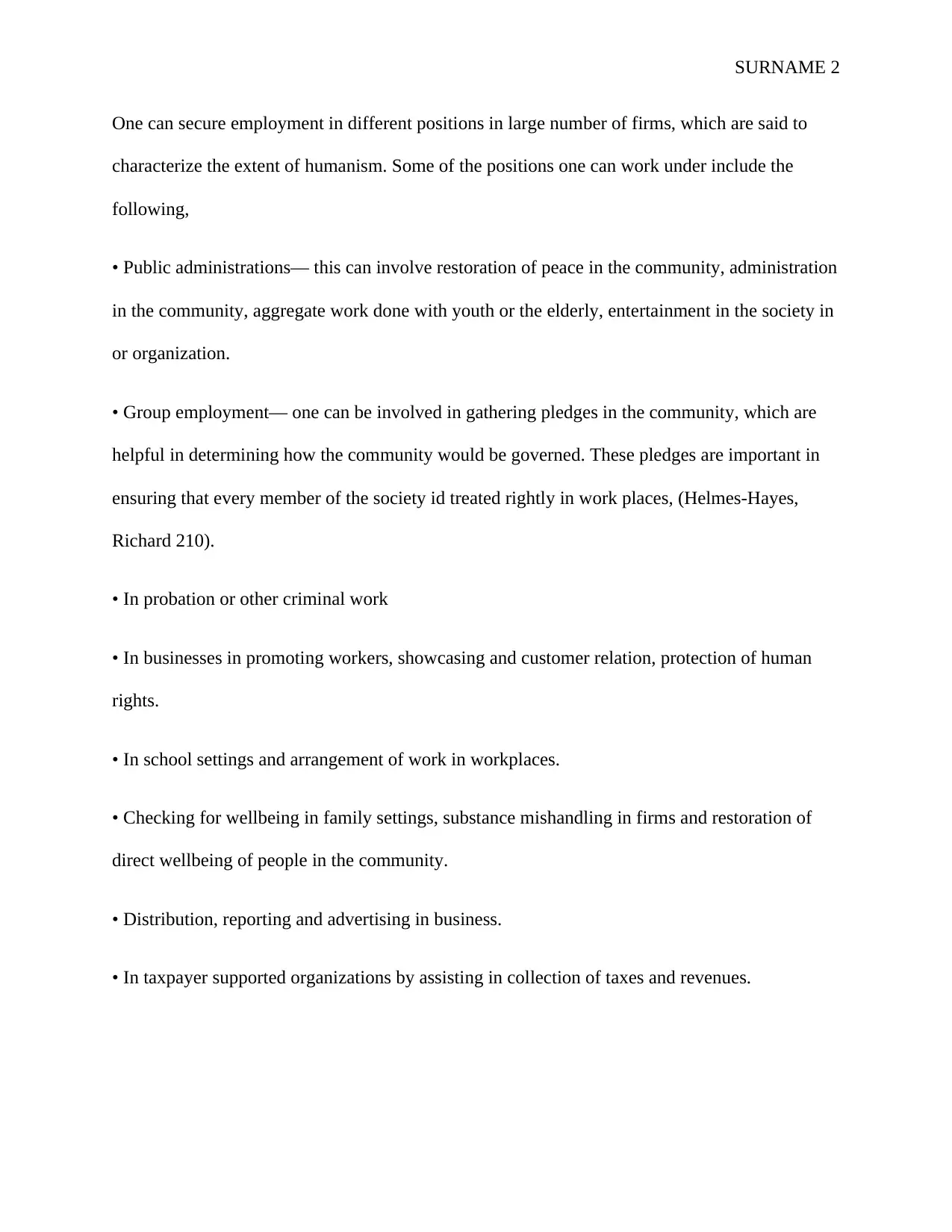
SURNAME 2
One can secure employment in different positions in large number of firms, which are said to
characterize the extent of humanism. Some of the positions one can work under include the
following,
• Public administrations— this can involve restoration of peace in the community, administration
in the community, aggregate work done with youth or the elderly, entertainment in the society in
or organization.
• Group employment— one can be involved in gathering pledges in the community, which are
helpful in determining how the community would be governed. These pledges are important in
ensuring that every member of the society id treated rightly in work places, (Helmes-Hayes,
Richard 210).
• In probation or other criminal work
• In businesses in promoting workers, showcasing and customer relation, protection of human
rights.
• In school settings and arrangement of work in workplaces.
• Checking for wellbeing in family settings, substance mishandling in firms and restoration of
direct wellbeing of people in the community.
• Distribution, reporting and advertising in business.
• In taxpayer supported organizations by assisting in collection of taxes and revenues.
One can secure employment in different positions in large number of firms, which are said to
characterize the extent of humanism. Some of the positions one can work under include the
following,
• Public administrations— this can involve restoration of peace in the community, administration
in the community, aggregate work done with youth or the elderly, entertainment in the society in
or organization.
• Group employment— one can be involved in gathering pledges in the community, which are
helpful in determining how the community would be governed. These pledges are important in
ensuring that every member of the society id treated rightly in work places, (Helmes-Hayes,
Richard 210).
• In probation or other criminal work
• In businesses in promoting workers, showcasing and customer relation, protection of human
rights.
• In school settings and arrangement of work in workplaces.
• Checking for wellbeing in family settings, substance mishandling in firms and restoration of
direct wellbeing of people in the community.
• Distribution, reporting and advertising in business.
• In taxpayer supported organizations by assisting in collection of taxes and revenues.
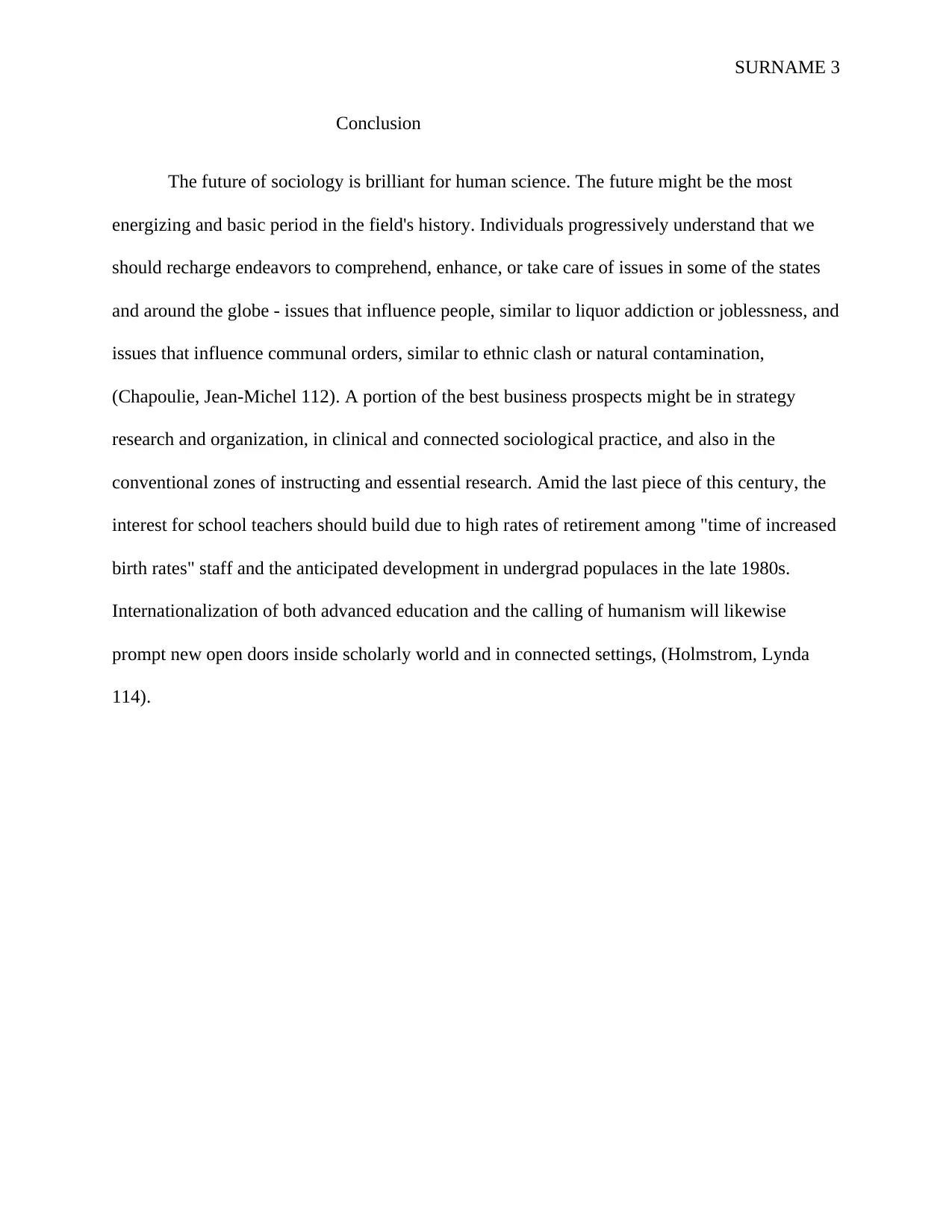
SURNAME 3
Conclusion
The future of sociology is brilliant for human science. The future might be the most
energizing and basic period in the field's history. Individuals progressively understand that we
should recharge endeavors to comprehend, enhance, or take care of issues in some of the states
and around the globe - issues that influence people, similar to liquor addiction or joblessness, and
issues that influence communal orders, similar to ethnic clash or natural contamination,
(Chapoulie, Jean-Michel 112). A portion of the best business prospects might be in strategy
research and organization, in clinical and connected sociological practice, and also in the
conventional zones of instructing and essential research. Amid the last piece of this century, the
interest for school teachers should build due to high rates of retirement among "time of increased
birth rates" staff and the anticipated development in undergrad populaces in the late 1980s.
Internationalization of both advanced education and the calling of humanism will likewise
prompt new open doors inside scholarly world and in connected settings, (Holmstrom, Lynda
114).
Conclusion
The future of sociology is brilliant for human science. The future might be the most
energizing and basic period in the field's history. Individuals progressively understand that we
should recharge endeavors to comprehend, enhance, or take care of issues in some of the states
and around the globe - issues that influence people, similar to liquor addiction or joblessness, and
issues that influence communal orders, similar to ethnic clash or natural contamination,
(Chapoulie, Jean-Michel 112). A portion of the best business prospects might be in strategy
research and organization, in clinical and connected sociological practice, and also in the
conventional zones of instructing and essential research. Amid the last piece of this century, the
interest for school teachers should build due to high rates of retirement among "time of increased
birth rates" staff and the anticipated development in undergrad populaces in the late 1980s.
Internationalization of both advanced education and the calling of humanism will likewise
prompt new open doors inside scholarly world and in connected settings, (Holmstrom, Lynda
114).
⊘ This is a preview!⊘
Do you want full access?
Subscribe today to unlock all pages.

Trusted by 1+ million students worldwide
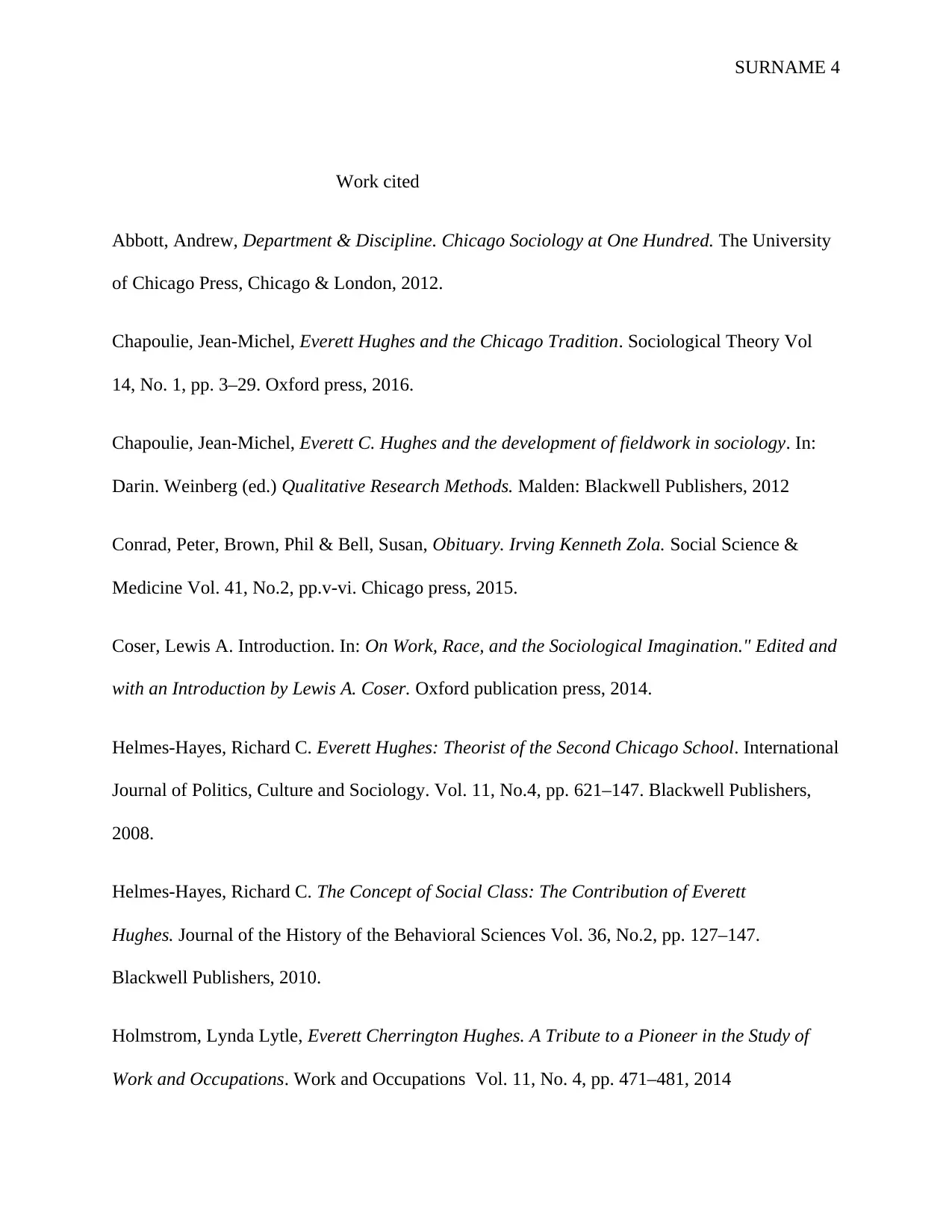
SURNAME 4
Work cited
Abbott, Andrew, Department & Discipline. Chicago Sociology at One Hundred. The University
of Chicago Press, Chicago & London, 2012.
Chapoulie, Jean-Michel, Everett Hughes and the Chicago Tradition. Sociological Theory Vol
14, No. 1, pp. 3–29. Oxford press, 2016.
Chapoulie, Jean-Michel, Everett C. Hughes and the development of fieldwork in sociology. In:
Darin. Weinberg (ed.) Qualitative Research Methods. Malden: Blackwell Publishers, 2012
Conrad, Peter, Brown, Phil & Bell, Susan, Obituary. Irving Kenneth Zola. Social Science &
Medicine Vol. 41, No.2, pp.v-vi. Chicago press, 2015.
Coser, Lewis A. Introduction. In: On Work, Race, and the Sociological Imagination." Edited and
with an Introduction by Lewis A. Coser. Oxford publication press, 2014.
Helmes-Hayes, Richard C. Everett Hughes: Theorist of the Second Chicago School. International
Journal of Politics, Culture and Sociology. Vol. 11, No.4, pp. 621–147. Blackwell Publishers,
2008.
Helmes-Hayes, Richard C. The Concept of Social Class: The Contribution of Everett
Hughes. Journal of the History of the Behavioral Sciences Vol. 36, No.2, pp. 127–147.
Blackwell Publishers, 2010.
Holmstrom, Lynda Lytle, Everett Cherrington Hughes. A Tribute to a Pioneer in the Study of
Work and Occupations. Work and Occupations Vol. 11, No. 4, pp. 471–481, 2014
Work cited
Abbott, Andrew, Department & Discipline. Chicago Sociology at One Hundred. The University
of Chicago Press, Chicago & London, 2012.
Chapoulie, Jean-Michel, Everett Hughes and the Chicago Tradition. Sociological Theory Vol
14, No. 1, pp. 3–29. Oxford press, 2016.
Chapoulie, Jean-Michel, Everett C. Hughes and the development of fieldwork in sociology. In:
Darin. Weinberg (ed.) Qualitative Research Methods. Malden: Blackwell Publishers, 2012
Conrad, Peter, Brown, Phil & Bell, Susan, Obituary. Irving Kenneth Zola. Social Science &
Medicine Vol. 41, No.2, pp.v-vi. Chicago press, 2015.
Coser, Lewis A. Introduction. In: On Work, Race, and the Sociological Imagination." Edited and
with an Introduction by Lewis A. Coser. Oxford publication press, 2014.
Helmes-Hayes, Richard C. Everett Hughes: Theorist of the Second Chicago School. International
Journal of Politics, Culture and Sociology. Vol. 11, No.4, pp. 621–147. Blackwell Publishers,
2008.
Helmes-Hayes, Richard C. The Concept of Social Class: The Contribution of Everett
Hughes. Journal of the History of the Behavioral Sciences Vol. 36, No.2, pp. 127–147.
Blackwell Publishers, 2010.
Holmstrom, Lynda Lytle, Everett Cherrington Hughes. A Tribute to a Pioneer in the Study of
Work and Occupations. Work and Occupations Vol. 11, No. 4, pp. 471–481, 2014
Paraphrase This Document
Need a fresh take? Get an instant paraphrase of this document with our AI Paraphraser
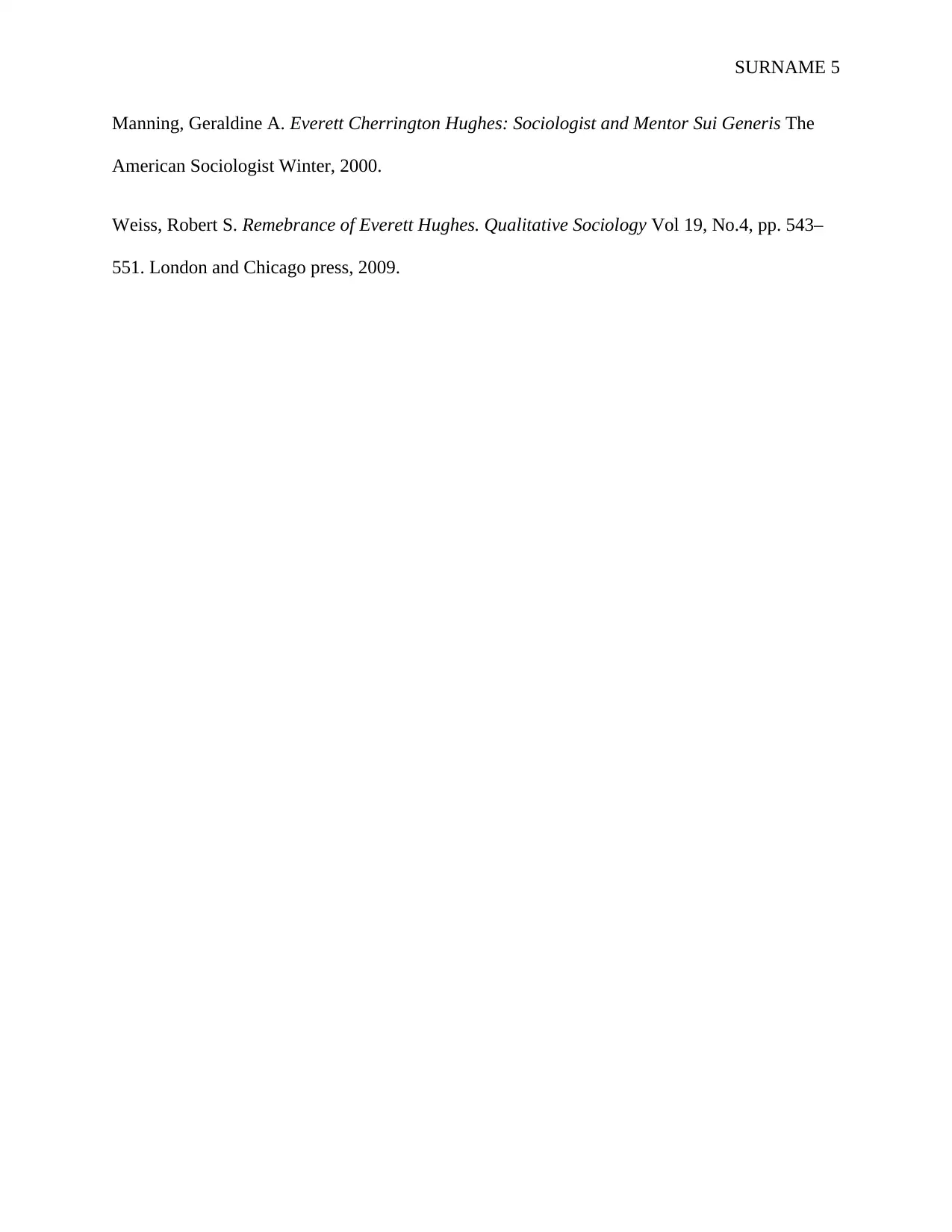
SURNAME 5
Manning, Geraldine A. Everett Cherrington Hughes: Sociologist and Mentor Sui Generis The
American Sociologist Winter, 2000.
Weiss, Robert S. Remebrance of Everett Hughes. Qualitative Sociology Vol 19, No.4, pp. 543–
551. London and Chicago press, 2009.
Manning, Geraldine A. Everett Cherrington Hughes: Sociologist and Mentor Sui Generis The
American Sociologist Winter, 2000.
Weiss, Robert S. Remebrance of Everett Hughes. Qualitative Sociology Vol 19, No.4, pp. 543–
551. London and Chicago press, 2009.
1 out of 5
Related Documents
Your All-in-One AI-Powered Toolkit for Academic Success.
+13062052269
info@desklib.com
Available 24*7 on WhatsApp / Email
![[object Object]](/_next/static/media/star-bottom.7253800d.svg)
Unlock your academic potential
Copyright © 2020–2026 A2Z Services. All Rights Reserved. Developed and managed by ZUCOL.





